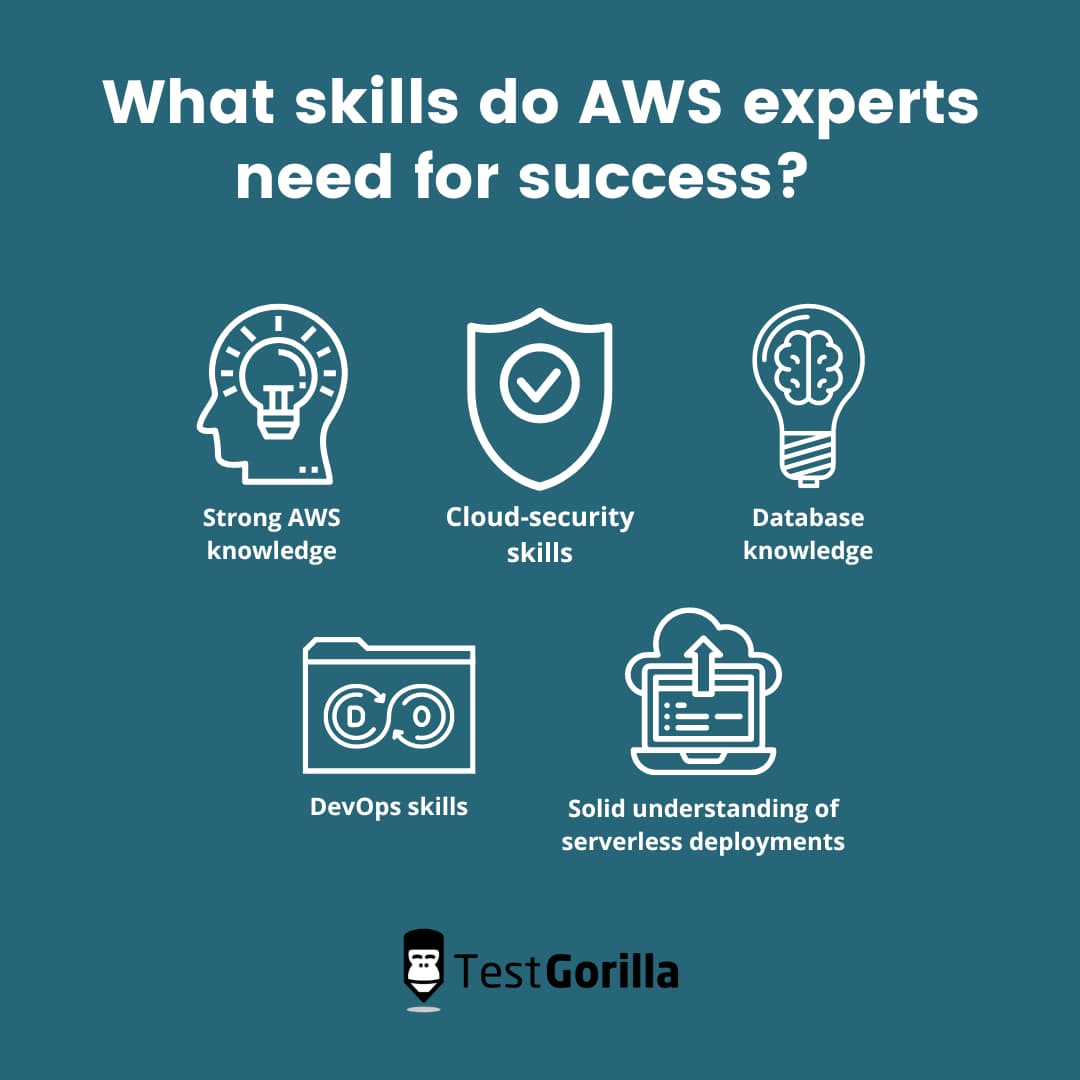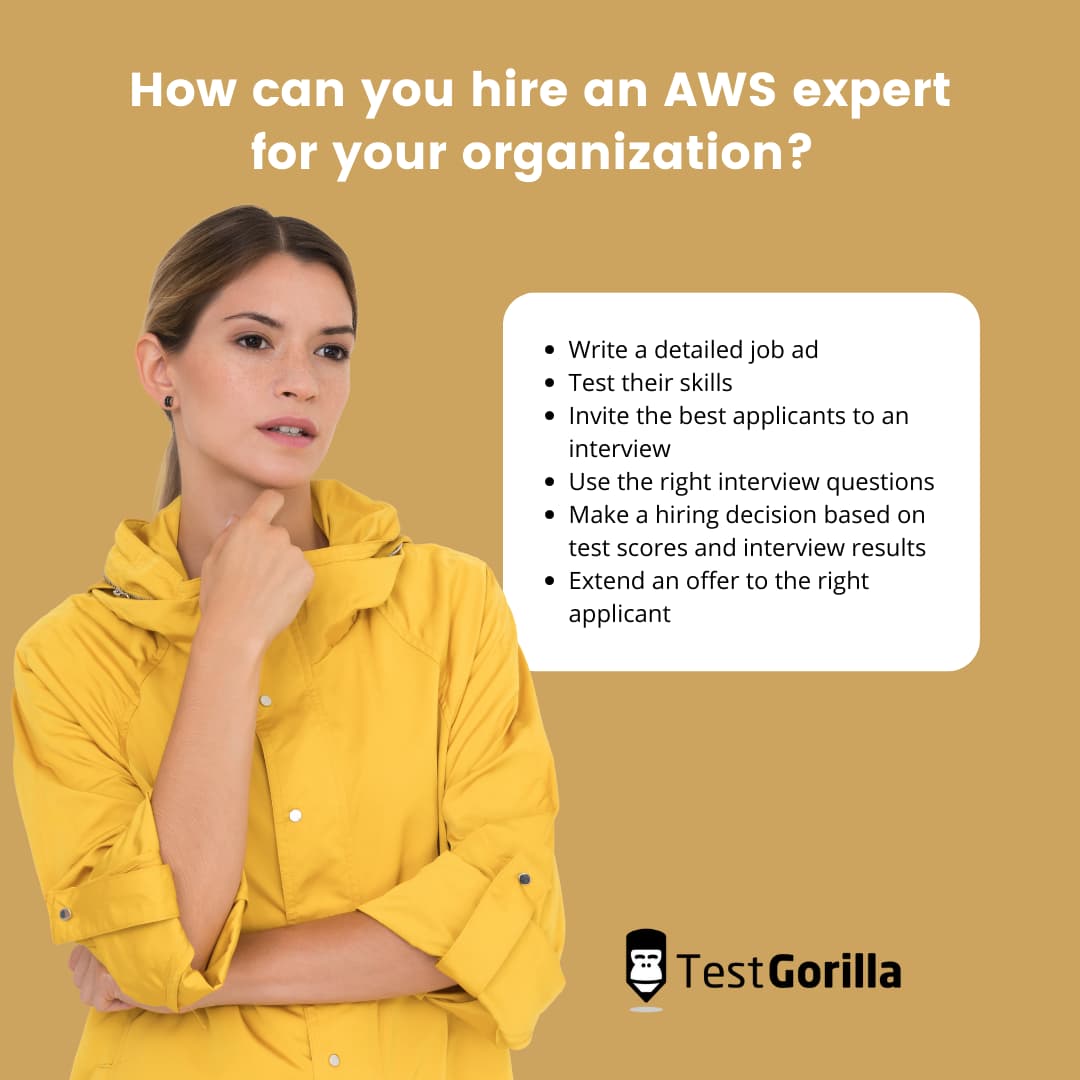AWS, Amazon’s cloud service, has become increasingly popular in the past few years: Companies such as Netflix, Pfizer, and Samsung use it to run their platforms. But experienced AWS specialists are not easy to recruit, partly because of the novelty of the role.
If you’re looking to hire an AWS expert, there are some skills you need to assess. Firstly, and most importantly, you must ensure they have the right AWS skills for the role.
Then, you must ensure they have in-depth knowledge of cloud systems and tools, cloud security, and databases. You should also evaluate their soft skills like communication and critical-thinking skills.
In this article, we’ll explain how you can assess these skills, and we’ll guide you through the process of hiring an AWS expert.
But first, let’s look at the role of an AWS expert.
What do AWS experts do?
AWS experts are most often software developers who work with AWS. However, there are several other roles that also require strong AWS knowledge.
AWS experts might include any of the following:
Cloud developers
AWS cloud architects
Cloud system administrators
DevOps engineers
Big data specialists
In this section, we’ll look into the first role, which is also the most common: cloud developers working with AWS.
An AWS developer builds and integrates applications, databases, and systems on AWS. Their specific responsibilities will depend on the organization they’re working for and the exact product they’re developing, but in most cases, they will:
Develop and deploy applications that run on AWS
Assess application infrastructure and propose improvements
Make security assessments and minimize applications’ security risks
Design and build efficient migration strategies (from on-premise servers or cloud services to AWS)
Consider the cost efficiency of different AWS solutions
Provide infrastructure maintenance and build and maintain different monitoring solutions
This list is not exhaustive, as no two AWS roles are alike, but it covers some of the primary responsibilities of cloud developers who work with AWS.
Which tools and applications do AWS experts use in their work?
Amazon offers an enormous variety of web services for many kinds of applications, such as analytics, computing, databases, security, and more. Some of the most popular AWS services used by AWS experts include:
Amazon EC2 (Elastic Compute Cloud)
Amazon S3
Amazon AppStream 2.0
Amazon DynamoDB
Amazon Lambda
Amazon Lake Formation
AWS Elastic Beanstalk
Amazon VPC
Amazon CloudFront
The services used will depend on the specifics of each project, but a talented AWS professional should be able to get up to speed with new services fairly quickly.
Along with these services, AWS experts might need to be proficient with different tools, frameworks, or programming languages. Examples include Kubernetes, Docker, Node.js, Jenkins, and more.
When hiring an AWS expert, you need to consider applicants’ experience with the services and tools you’re using, as well as their willingness to learn new technologies. You don’t need your new employee to know everything – you need someone willing to learn and grow.
The best insights on HR and recruitment, delivered to your inbox.
Biweekly updates. No spam. Unsubscribe any time.
What skills do AWS experts need for success?
AWS experts need a range of skills to be successful. While these will depend on the role’s specific responsibilities, there are some important skills nearly all AWS experts need:
Strong AWS knowledge: Obviously, AWS experts need to know AWS inside out. The best way to assess AWS skills is by using an AWS test. AWS offers different certification programs, so you might also check if applicants have these.
Cloud-security skills: Cloud security is essential for AWS experts, especially if they’ll be working on applications using sensitive information.
Database knowledge: A strong understanding of databases is a must for AWS experts, along with proficiency with specific databases (such as MongoDB and MySQL) and AWS database services (such as Amazon RDS or Amazon DynamoDB, among others).
DevOps skills: AWS developers often work in teams using the DevOps framework, which means knowing DevOps best practices is important. You can use a DevOps test to assess this skill.
Solid understanding of serverless deployments: Serverless deployments and provisioning are all the rage in cloud development. Companies that use AWS often use serverless deployments, so AWS experts need to be familiar with these.
How can you hire an AWS expert for your organization?
In this section, we’ll explore the steps you need to take to hire a talented AWS expert for your organization.
As you’ll see, the hiring process doesn’t need to be complex to be effective, even for highly technical roles. In fact, a simple hiring process using the right tools is all you need to make the best hiring decisions.
So, here’s your step-by-step guide to hiring a knowledgeable AWS professional for your organization:
1. Write a detailed job ad
In the job ad, include as much information on the role as possible, as well as details of the AWS project they’ll be working on. Separate the requirements into categories, such as must-have and nice-to-have.
Keep in mind that many AWS experts are already working for other companies and not actively looking for a job, so you might need to use passive recruitment strategies.
2. Test their skills
We advise you to test the skills of all applicants and simply get rid of CV screening. Skills testing is a reliable assessment method that gives you objective results and enables you to identify your best applicants quickly. Build a skills assessment based on the role’s requirements, and remember to include an AWS test.
3. Invite the best applicants to an interview
Invite your most skilled applicants to an interview to further evaluate their skills and profiles. Inform disqualified candidates that you won’t be proceeding with their applications.
4. Use the right interview questions
Use a structured interview to minimize bias. In this approach, you ask all applicants the same questions to reduce bias and stick to questions relevant to the role (yes, you can still use behavioral questions).
If you need inspiration for your interview questions, here are some lists you can use:
52 cybersecurity interview questions for your candidates – Use these questions along with some sample answers to help you assess the knowledge and skills of your applicants.
51 software engineer interview questions – Hire exceptional talent with these interview questions for software engineers.
60 Kubernetes interview questions – Use these questions to hire top Kubernetes developers.
50 DevOps interview questions to find your next DevOps engineer – From beginner to advanced, use these interview questions and sample answers to help you find the best DevOps developers.
5. Make a hiring decision based on test scores and interview results
Based on the information you’ve obtained from skills assessments and the interview stage, you’ll now be able to make a bias-free hiring decision easily.
5. Extend an offer to the right applicant
The last step is to extend an offer to your best applicant, negotiating the contract terms and start date.
As you can see, the hiring process doesn’t need to be complicated. In fact, the faster you act, the higher your chances of hiring the right person. AWS experts are a rare breed; if it takes you months to make a choice, you risk losing your best applicants to competitors.
And given how fast things are moving in the tech world, you probably needed to hire them yesterday, so the simpler the hiring process, the better – for you, your team, and the applicants.
Hiring the right AWS expert isn’t difficult with the right tools
Skilled AWS experts are not always easy to recruit for two main reasons:
They’re in high demand, so your hiring process needs to be optimized to get the best talent
You need to assess their technical and soft skills accurately and objectively
However, with skills tests, all these challenges become easy to overcome. By assessing applicants’ skills fairly and accurately, not only will you show them that you value their talent and knowledge, but you will also optimize and shorten your recruitment process.
And with TestGorilla, you can test for the precise skills you need for your open role – our test library features hundreds of tests you can use alongside our AWS test to build your skills assessment and hire the perfect match.
Register for free today and start making better hiring decisions, faster and bias-free.
You've scrolled this far
Why not try TestGorilla for free, and see what happens when you put skills first.
















